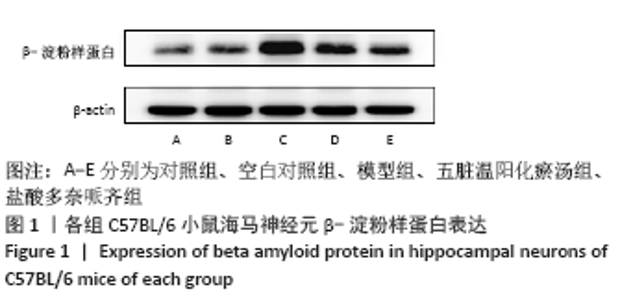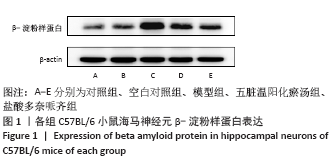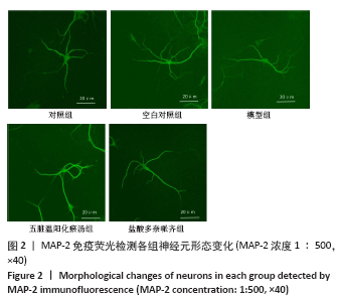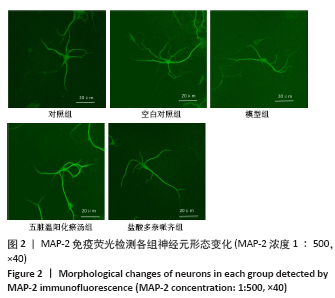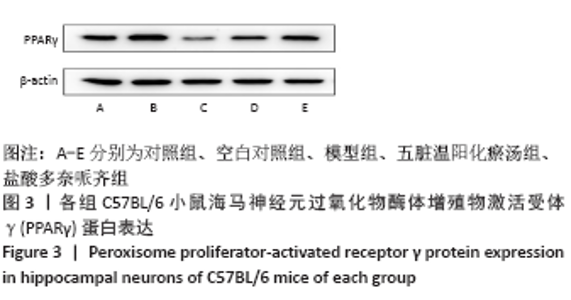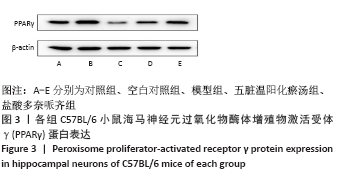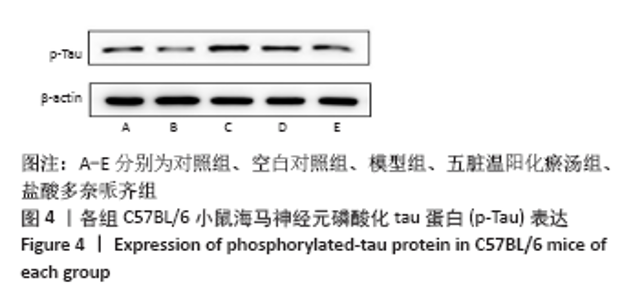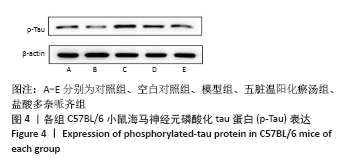[1] 卢冲,李新宇,孙宇,等.胰高血糖素样肽1(GLP-1)改善阿尔茨海默病大鼠模型的认知功能及其机制研究[J].卒中与神经疾病,2019, 26(2):193-197.
[2] HARDY J, SELKOE DJ. The amyloid hypothesis of Alzheimer’s disease: progress and problems on the road to therapeutics. Science. 2002; 297(5580):353-356.
[3] 唐睿.阿尔茨海默病发病机理与治疗策略[J].中山大学研究生学刊(自然科学、医学版),2013,34(2):31-42.
[4] DU J, ZHANG L, LIU S, et al. PPARgamma transcriptionally regulates the expression of insulin-degrading enzyme in primary neurons. Biochem Biophys Res Commun. 2009;383(4):485-490.
[5] 邓燕.五脏温阳化瘀汤治疗老年性痴呆的疗效研究[D].南宁:广西中医药大学,2017.
[6] 王韵桥,夏猛,曹传东,等.五脏温阳化瘀汤对血管性痴呆模型大鼠海马组织PI3K/Akt-mTOR信号通路的影响[J].中医杂志,2019, 60(16):1412-1416.
[7] 王韵桥,夏猛,唐农.五脏温阳化瘀法治疗老年期痴呆[J].中医学报,2019,34(10):2075-2078.
[8] 陈炜,吴林,胡跃强,等.五脏温阳化瘀汤治疗肾虚血瘀型老年性痴呆30例临床研究[J].湖南中医杂志,2018,34(9):4-6,15.
[9] 梁晓兵.五脏温阳化瘀汤治疗动脉硬化性血管性老年痴呆疗效观察[J].内蒙古中医药,2019,38(2):6-7.
[10] 唐农,王晋平,吴林,等.五脏温阳化瘀胶囊治疗血管性痴呆临床疗效观察[J].辽宁中医药大学学报,2015,17(9):25-27.
[11] 翟阳,唐农,黎军宏,等.五脏温阳化瘀胶囊治疗血管性痴呆的随机对照临床研究[J].辽宁中医杂志,2017,44(6):1212-1214.
[12] 向军军.五脏温阳化瘀汤治疗阳虚型血管性痴呆的临床疗效观察[D].南宁:广西中医药大学,2016.
[13] 农微,卫智权,莫雪妮,等.五脏温阳化瘀汤抑制周期蛋白依赖激酶-5过表达对SAMP8小鼠脑神经纤维缠结的影响[J].中国实验方剂学杂志,2019,25(9):61-66.
[14] 王韵桥,夏猛,曹传东,等.五脏温阳化瘀汤对血管性痴呆模型大鼠Bcl-2及Caspase相关蛋白表达的影响[J].中华中医药杂志,2020, 35(2):625-628.
[15] 李仪奎.中药血清药理学实验方法的若干问题[J].中药新药与临床药理,1999(2):95.
[16] 张灵娜,林兵,宋洪涛.中药血清药理学、血清药物化学的研究概况及展望[J].中草药,2015,46(17):2662-2666.
[17] 郑衍芳,孙田静,郑丽萍,等.Aβ(1-42)寡聚体诱导阿尔茨海默病动物模型的研究[J].医学综述,2016,22(15):2954-2956.
[18] 张龙. Aβ1-42寡聚体2对PC-12胰岛素P13K/PKB信号转导通路的影响[D].遵义:遵义医学院,2013.
[19] 张婉涛,刘玲,董欢欢.五脏生理病理特点在血管性认知障碍发病中的作用[J].湖北中医药大学学报,2014,16(1):70-71.
[20] 唐农, 古联,严雁.五脏温阳化瘀汤治疗动脉硬化性血管性痴呆87例临床疗效观察[J].时珍国医国药,2015,26 (6) :1421-1422.
[21] 张海燕,唐农,葛金文,等.五脏温阳化瘀汤对动脉粥样硬化血管性痴呆大鼠海马组织 Nrf2 蛋白通路的影响[J].云南中医学院学报, 2013,36(3):8-11.
[22] 张海燕.五脏温阳化瘀汤对动脉粥样硬化血管性痴呆大鼠作用机理的研究[D].长沙:湖南中医药大学,2013.
[23] 周利.阿尔兹海默症发病过程Aβ降解酶的变化规律和相互关系以及初步药物研究[D].上海:华东理工大学,2016.
[24] 卫智权,农微,莫雪妮,等.五脏温阳化瘀汤对SAMP8小鼠Tau蛋白过磷酸化与神经纤维缠结的抑制作用[J].中华中医药学刊, 2019,37(11):2583-2587,2818-2819.
[25] 农微,卫智权,莫雪妮,等.五脏温阳化瘀汤调节蛋白磷酸酶2A甲基化对Tau蛋白过磷酸化的抑制作用[J].时珍国医国药,2019, 30(8):1810-1813.
[26] 王金春,刘慧影,曹云鹏.tau蛋白与阿尔茨海默病[J].中国组织工程研究,2020,24(17):2775-2781.
[27] 莫玉言,侯加卫,周张玖智,等.星形胶质细胞调控下红花黄色素对Aβ(1-42)介导的海马神经元突触损伤的保护作用研究[J].石河子大学学报(自然科学版),2019,37(1):47-54.
[28] RAPOPORT M, DAWSON HN, BINDER LI, et al. Tau is essential to beta -amyloid-induced neurotoxicity. Proc Natl Acad Sci U S A. 2002;99(9): 6364-6369.
[29] 王丹琼,卜星彭,王蕾,等.替米沙坦对高血压合并阿尔茨海默病患者血清Aβ蛋白、Tau蛋白和炎性细胞因子的影响[J].山西医科大学学报,2017,48(6):546-549.
[30] CAMACHO IE, SERNEELS L, SPITTAELS K, et al. Peroxisome-proliferator-activated receptor gamma induces a clearance mechanism for the amyloid-beta peptide. J Neurosci. 2004;24(48):10908-10917.
[31] GURLEY C, NICHOLS J, LIU S, et al. Microglia and Astrocyte Activation by Toll-Like Receptor Ligands: Modulation by PPAR-gamma Agonists. PPAR Res. 2008;2008:453120.
[32] 晏昆,蒙凌,陈玉芳.PPARγ基因多态性与动脉粥样硬化性脑梗死的相关性研究[J].中国现代药物应用,2020,14(9):31-33.
[33] 宋楠,秦川.PPARγ在阿尔茨海默病中的作用及影响因素研究进展[J].医学研究生学报,2015,28(9):989-994.
[34] QUINTANILLA RA, UTRERAS E, CABEZAS-OPAZO FA. Role of PPAR gamma in the Differentiation and Function of Neurons. PPAR Res. 2014; 2014:768594.
[35] MA RH, ZHANG Y, HONG XY, et al. Role of microtubule-associated protein tau phosphorylation in Alzheimer’s disease. J Huazhong Univ Sci Technolog Med Sci. 2017;37(3):307-312.
[36] WANG JC, ZHU K, ZHANG HY, et al. Early active immunization with Aβ3-10-KLH vaccine reduces tau phosphorylation in the hippocampus and protects cognition of mice. Neural Regen Res. 2020;15(3):519-527.
[37] ESCRIBANO L, SIMÓN AM, GIMENO E, et al. Rosiglitazone rescues memory impairment in Alzheimer’s transgenic mice: mechanisms involving a reduced amyloid and tau pathology. Neuropsychopharmacology. 2010;35(7):1593-1604. |
